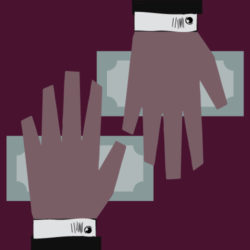Afghanistan lost because money won
To get Oliver Bullough’s weekly Oligarchy delivered straight into your inbox sign up here
AFGHANISTAN
As someone who wasn’t John F. Kennedy first remarked, “victory has a hundred fathers, but defeat is an orphan” and few defeats are as comprehensively abandoned as that of the West in Afghanistan. Europeans have blamed Americans; Americans have blamed Afghans; and ordinary Afghans once again are paying the price for it all.
Many veterans are saying that they feel betrayed that the sacrifices they and their friends made in fighting the Taliban counted for nothing, including in this moving speech by Tom Tugendhat in the British House of Commons. I can’t help feeling, however, that the seeds of defeat were sown long ago, by our failure to insist that the Afghan officials use the money given to them for the good of the country, rather than keep it for themselves.
- “Civilian officials at the Pentagon and their counterparts at the U.S. Department of State and in the intelligence agencies had long dismissed corruption as a significant factor in the U.S. mission in Afghanistan. Many subscribed to the belief that corruption was just part of Afghan culture — as if anyone willingly accepts being humiliated and robbed by government officials. In more than a decade of working to expose and fight corruption in Afghanistan, I was never told by a single Afghan, “We don’t really mind corruption; it’s part of our culture.” Such comments about Afghanistan invariably came only from Westerners,” wrote Sarah Chayes in Foreign Affairs.
Chayes is not just being wise after the fact, she was making the same points a decade ago, and published an excellent book in 2015 laying them out in detail. A year after that, John Sopko, the Special Inspector General for Afghanistan Reconstruction, made similar points in a report for Congress.
- “Our analysis reveals that corruption substantially undermined the U.S. mission in Afghanistan from the very beginning of Operation Enduring Freedom. We found that corruption cut across all aspects of the reconstruction effort, jeopardizing progress made in security, rule of law, governance, and economic growth. We conclude that failure to effectively address the problem means U.S. reconstruction programs, at best, will continue to be subverted by systemic corruption and, at worst, will fail,” the report said.
Corruption undermines our friends and emboldens our enemies; it acted as a recruiting sergeant for the Taliban, while sapping the government troops’ willingness to fight. Why die when the president is going to flee at the first sign of danger?
Of course, the United States is not solely to blame for the failure to recognize that if you don’t conquer corruption, you can’t win a war. European countries have proved as persistently incapable of paying for any international law enforcement effort as they are of paying for their own defense. And outside NATO countries, the country is worse. There are very many jurisdictions that are happy to accept money from anyone, not least Dubai, as detailed in this Carnegie report published last year.
- “For almost two decades now, billions of dollars in corruption proceeds have been funneled from Afghanistan, a country devastated by four decades of conflict, to Dubai. These outflows have played a part in stunting Afghanistan’s economic and political development, facilitating the resurgence of the Taliban, and exacerbating regional instability,” wrote Brian George.
All these different places make their own sovereign decisions, which obviously means Washington and other Western capitals struggle to influence them. However, if the battle against the coronavirus shows anything, it is that governments can do incredible things if they decide they want to (as John Maynard Keynes said in 1942, during a very different crisis, “anything we can actually do, we can afford”). The flip side of that is: if we haven’t done something, it is because we didn’t make a priority of it.
Conclusion: we rated maintaining the laissez-faire global financial system as of greater importance than the battle for Afghanistan. If we had wanted to track or block the movement of stolen money, we could have, we just chose not to.
So, why is that? During the last few weeks, I have been checking and re-checking the manuscript for my next book – called Butler to the World, and due out in March – in which I argue that Britain and other Western countries have consistently prioritized the desire of wealthy people and companies to move money seamlessly whenever and wherever they like, over the harm done to vulnerable people by kleptocracy and financial crime.
Are we thus selling our enemies the rope with which they’ll hang us? Last month’s events in Afghanistan suggests to me that we are, and that – if we don’t want to keep losing – we should heed the message. The Taliban are bad enough, but other enemies are far worse.
We are a long way from this realization as it stands, however. Instead of cutting kleptocrats off from our economies, Western countries are lining up to offer them the best financial, legal and reputation management services that money can buy.
- “The legal profession’s defense of itself has been that all clients are equal before the law, that access to justice is a right and that even corrupt oligarchs are innocent until proven guilty. However, the victims of corruption around the world do not see it in the same way. They see funds plundered from their country being placed in the UK — often via its crown dependencies and overseas territories — and the same money being used to hire top lawyers to keep it safe. They stand no chance of being proven guilty in their own countries as they write the laws and control the courts,” writes Robert Barrington of the Centre for the Study of Corruption at the UK’s Sussex University.
BIT WEIRD
So, El Salvador has adopted Bitcoin as legal tender, thus becoming the first country to do so. I remain convinced that all cryptocurrencies are simultaneously a scam and over-hyped: if they could do all the things their supporters say, they’d have taken over the world already; and if they were as bad as their detractors say, governments would have shut them down.
I can see why El Salvador is keen: one of the few ethical ways that cryptocurrencies can out-compete traditional money is in sending remittances around the world, and this is an economy with a lot of workers overseas. However, on balance I think it’s a bad thing: Latin America and the Caribbean already have enough problems with money laundering and fraud without blowing another hole in the ramparts protecting our financial system.
However, no one appears to care much about that, since the news of late suggests that blockchain-enabled payment mechanisms are taking flight more and more frequently, much to the confusion of regulators, who are struggling to know how to tackle these new products.
I found myself wondering how new these products really are, however. It is in the nature of financial innovation to stress how innovative it is, but the claims are almost always false, since finance has done the same thing for millennia: it takes money from people that have it but don’t need it and gives it to people who need it but don’t have it, while taking a fee for its trouble. Governments intervene to ensure the stability and cleanliness of the system, and “financial innovation” is just participants’ attempts to circumvent those interventions.
Back in the years before 2007, we were accustomed to hearing how financial innovation had created risk-free investment products that would guarantee growth for ever. As you may remember, that turned out to be false: the innovations were simply repackaging of old ideas with fancy new names.
And that brings me to Kraken Bank, the Wyoming-registered “crypto bank”, the first such institution in the US. It calls itself a bank, but deposits in its accounts will not be insured by the Federal Deposit Insurance Corporation, something that previous bouts of financial innovation have consistently and overwhelmingly shown to be a good thing.
- “We will operate in a safe and sound manner that prioritizes customer fund protection. Therefore, we will not have insolvency risk the FDIC is intended to safeguard. We will never need a bailout or any public-funded backstop, because our goal is to serve your needs and the needs of the community,” its website states.
If I had a dollar for every bank that has gone bust despite having claimed to operate in a safe and sound manner, I could probably start a bank of my own.
- “We cannot help but believe that the structure of Kraken Financial is an accident waiting to happen – prone to the same types of run risks as medieval banks and so-called ‘shadow banks’,” concluded the Bank Policy Institute last year.
YOU AND I WE’RE GOING TO LIVE FOREVER
One of the first things I did when I sat down at my desk this morning was to check the real-time billionaire ratings, and thus discovered that Jeff Bezos is still sitting on top of the world. His fellow centi-billionaires must be wondering if they can ever catch him up. Well, for them, it’s bad news because he has a new investment, which could well mean he’ll be with us forever.
Altos has been set up to investigate reprogramming the biochemical process by which parental DNA is de-aged before becoming the stem cells of a new organism. It could theoretically help people to live for decades longer than they already do, by zhuzhing up their DNA so they don’t age so fast.
Company filings in the U.K. show that the company is controlled by biologist and entrepreneur Richard Klausner, but that its sole shareholder is a U.S. company called Altos Labs. And who owns that? According to Technology Review, investors include Russian tech billionaire Yuri Milner, and Bezos himself. The company is going round hiring top academics, pointing them at reprogramming and telling them to get on with it.
- “The philosophy of Altos Labs is to do curiosity-driven research. This is what I know how to do and love to do,” says Manuel Serrano of the Institute for Research in Biomedicine, in Barcelona. “In this case, through a private company, we have the freedom to be bold and explore…The aim is to understand rejuvenation.”
WHAT I’M READING
Mostly of late I seem to have been reading proofs of my own book. It’s amazing how many mistakes persist and only get picked up on after I’ve blithely read past them on 15 previous occasions. Still, hopefully I’ll soon have time to spread my wings a little. In the meantime, I really enjoyed this piece by Andrei Soldatov, the great expert on Russia’s security services, on an obscure third spy agency operating out of Russia.
- “Putin inaugurated a third foreign spy service… That this service emerged from Putin’s own political police, originally meant to safeguard his regime, is an indication of how he sees his fortunes at home to be inextricably bound up with those of Russia’s abroad. For the ruler of the Kremlin, Moscow is the world,” Soldatov writes.
It’s another sign of how Russia has changed that Soldatov felt it was no longer safe for him to be there. He has been living in the UK for a year.







